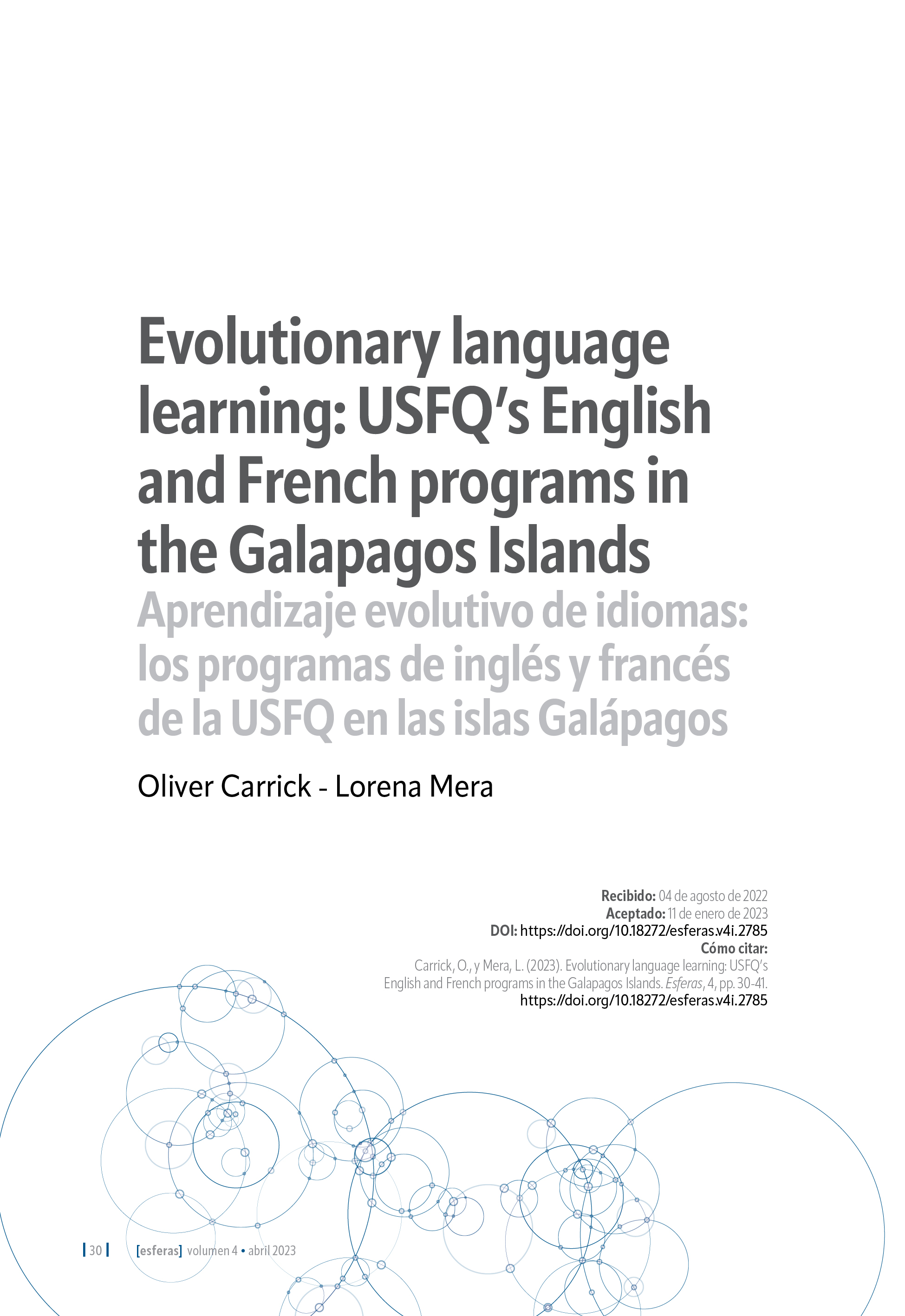
Published 2023-04-06
Keywords
- ESL,
- Education,
- language functions,
- Galapagos,
- bespoke course design
How to Cite
Copyright (c) 2023 Oliver Carrick, Jessica Lorena Mera Bolaños

This work is licensed under a Creative Commons Attribution-NonCommercial 4.0 International License.
Abstract
This essay discusses the development of a language learning program for the local community on the island of San Cristóbal in the Galapagos Islands. Second and third language skills are very important to residents of the Galapagos due to the islands’ dependency on the tourism sector. In pursuit of UN Sustainable Development Goal Four, Quality Education, the Department of Foreign Languages has implemented formal English and French as a Foreign Language education programs for children, adolescents and adults on San Cristóbal. USFQ’s Language Department in the Galapagos is small, but has used bespoke course design based around communicative functions to meet the needs of different groups within the local community.
Downloads
References
- Casta, J.S. & Hufana, E.R. (2016). Language Functions in ESL Textbooks, TESOL International Journal, 11 (1), 65-80. ISSN 2094-3938. TESOL International Journal - TESOL India. https://www.tesol.in/tesol-international-journal
- Consejo de Gobierno del Régimen Especial de Galápagos (CGREG). (2021). Plan Galápagos 2030: Plan de Desarrollo Sustentable y Ordenamiento Territorial del Régimen Especial de Galápagos (Plan Galapagos 2030: Sustainable Development and Territorial Management Plan of the Galapagos Special Regime), Galapagos, Ecuador.
- CGREG. (2020). El camino hacia una nueva ley de Galápagos (The road to a new Galapagos law), Galapagos, Ecuador.
- Ministerio de Educación. (2012). Estándares de calidad educativa: Ecuadorian In-service (English Teacher Standards/The English Language Learning Standards), Quito, Ecuador.
- Muhammed, A.C.P., Prakash, J. & Sindhu, H. (2018). Developing ESL/EFL Learners’ Grammatical Competence Through Communicative Activities, i-manager’s Journal on English Language Teaching, 8 (1), 63-70. https://imanagerpublications.com
- Nikolaeva, S. (2019). The Common European Framework for Languages: Past, Present and Future, Advanced Education, 12, 12-20. DOI: 10.20535/2410-8286.154993
- Régimen especial de Galápagos (Galapagos Special Regime). (2010). Galápagos Agenda para el Buen Vivir: Propuestas de desarrollo y Lineamientos para el Ordenamiento Territorial. (Galapagos Agenda for Buen Vivir: Development proposals and Guidelines for Territorial Planning) Ecuador: SENPLADES.
- Richards, J.C. (2001). Curriculum Development in Language Teaching. Cambridge University Press, Cambridge, UK.
- Santipolo, M. (2017). Bespoke Language Teaching (BLT): A proposal for a theoretical framework. A case of EFL/ELF for Italians. Studies in Second Language Learning and Teaching, 7(2), 233-249. DOI: 10.14746/ssllt.2017.7.2.4
- Singh Thakur, V., Mahad Al Mashani, S. & Almashikhi, K. (2019). Enhancing Communication Skills of ESL / EFL Learners Through In-class Project-Based Tasks and Activities: A Pedagogical Framework. Adalya Journal, 8(9), pp. 1357-1368. ISSN NO: 1301-2746. http://adalyajournal.com/
- United Nations Development Programme. (n.d.). Sustainable Development Goals: Goal 4 Quality Education. Accessed 7th June 2022, available online at: https://www.un.org/sustainabledevelopment.education
- Van Ek, J. A., & Trim, J. L. M. (1991). Threshold 1990. USA: Cambridge University Press.
